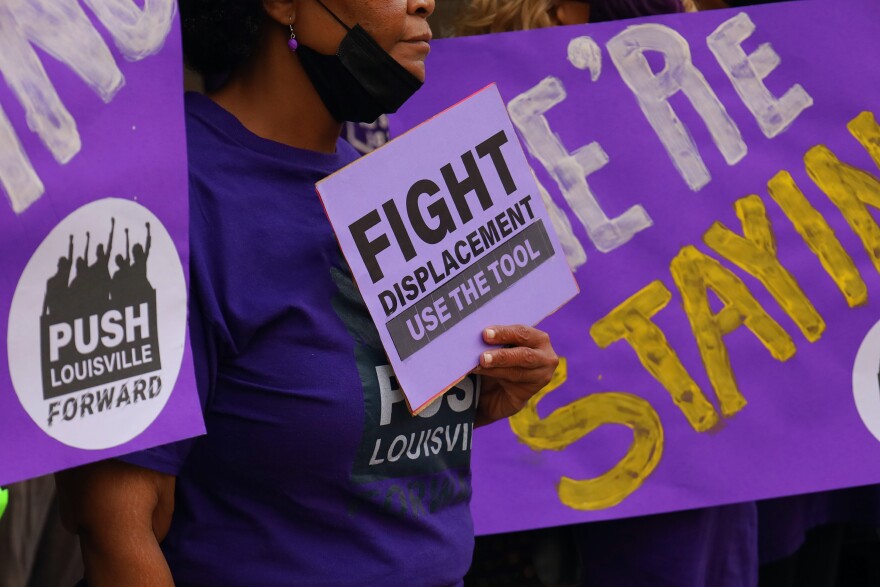Standing outside a city-owned building on South Fifth Street last month, advocates with the tenant union PUSH Louisville held signs saying “Stop playing, we’re staying” and “Fight displacement — use the tool.”
Jessica Bellamy, a tenant organizer with the group, called on Louisville officials to finish implementing anti-displacement measures that were signed into law almost two years ago.
“Six hundred days ago, our city passed one of the most powerful housing policies in this country, a policy that was supposed to end the days of our government handing out money, land and deals to developers who raise our rents and drive us out,” she said. “But here we are.”
Bellamy accused city leaders of dragging their feet “while our neighbors are being dragged out of their homes.”
She was referring to the anti-displacement ordinance that Louisville Metro Council approved unanimously in Nov. 2023 and took effect without Mayor Craig Greenberg’s signature. It was meant to help the city evaluate proposed development projects applying for taxpayer subsidies for whether they could displace nearby residents, a process known as gentrification.
Louisville’s Office of Housing and Community Development has recently started using the tool. But the Anti-Displacement Commission, which is supposed to guide the city’s use of the tool and investigate complaints of housing discrimination, has yet to meet.
‘Use the tool’
Louisville’s anti-displacement assessment tool is meant to decide which proposed developments should get public subsidies — and fundamentally change how the city evaluates the quality of some potential projects.
Metro Council approved the tool, created by researchers from Boston University, last November.
It uses data from the city’s housing needs assessment, which was updated last year. That report showed Louisville has a severe shortage of housing for its lowest-income residents, people making below 30% of the area median income, or about $30,000 for a family of four.
Jecorey Arthur, who sponsored the anti-displacement ordinance when he was the Metro Council member for District 4, said the tool tries to estimate the impact a project could have on the surrounding neighborhood, backed by data and research.
“It’s really easy to point to a development and say, ‘Oh, that’ll lead to gentrification,’ or, ‘That’ll lead to us getting displaced from our neighborhoods,’” he told LPM News. “Everybody has an opinion, whether it's a Metro Council member or a constituent, but if we can point to the data and what researchers have said would help keep neighborhoods affordable … then we can have an informed discussion.”
Arthur also said the tool, which is available for public use, should make the process easier and more transparent for developers applying for city funding.
Louisville’s Anti-Displacement Law requires an assessment for projects seeking to use Metro resources, including taxpayer dollars or city-owned land.
Aaron DuVall, a spokesperson for the city’s Cabinet for Economic Development, said in a statement that there have only been two new projects that have applied for funding since the tool was approved last November.
In one instance, the proposed development plan met requirements, DuVall said. For the second, the city demanded the developer make 10% of the units affordable to people earning 50% of the area median income, or about $50,000 for a family of four.
The developer then submitted a new proposal. Duvall said the exact terms are still being hammered out and the parties haven’t yet signed a conditional agreement.
Louisville’s anti-displacement ordinance is clear: If a project doesn’t pass the assessment, it can’t receive city funding.
The city’s Affordable Housing Trust Fund, which receives millions of taxpayer dollars each year, has also started using the assessment tool.
Christie McCravy, the Trust Fund’s executive director, said her staff has received training and access to the tool. They’ve used it on two projects so far, and they did not require any changes.
“The staff provides the tool results to the board,” which decides which projects to fund, McCravy said. “The project is either compliant or not.”
So far, none of the project assessments have been made public, which has frustrated advocates.
Arthur said the city should do more to promote the tool and make residents aware of how it's being used.
“The public isn’t informed about the developments happening in their community,” he said. “More importantly, they aren’t being informed about how those developments will impact the cost of living in their community.”

The law only requires the city to attach the final assessments to any funding request that requires Metro Council approval. It doesn’t mandate making them public otherwise.
Duvall said the two projects that requested funds from the Office of Housing and Community Development won’t need to go before the council. City staff will review the project internally.
Typically, the type of requests that need Metro Council approval are large projects receiving tax increment financing. In those cases, the city rebates some taxes back to the developer as an incentive to build.
Duvall said the project applications, as well as any other preliminary documents about the project, are exempt from public records.
He said that once the Anti-Displacement Commission gets up and running, housing officials plan to make regular reports to its members.
'We should have been meeting’
Louisville Metro started accepting applications from people interested in joining the Anti-Displacement Commission last June. Over a year later, the commission is still not fully seated.
According to the city’s boards and commissions portal, eight of the nine seats on the Anti-Displacement Commission are filled.
Beverly Morton, an organizer with PUSH Louisville, said she applied to be on the commission in June 2024. She wasn’t notified that she’d been appointed until a year later.
Morton said with most of the seats filled, the Anti-Displacement Commission has enough members to start its work.
“It’s just not right,” she said. “We should have been in a meeting, scheduling and on our jobs.”
Morton said she doesn’t understand the delay and she feels there hasn’t been enough communication from the city.
“Not all of us are getting the right info, to get the email, to get the schedule,” she said. “They’re stalling.”
Evan Bradley, another commission member, also said he’s ready to get on with the work.
“I think spending Metro Government funds on projects that actually help people is a big part of what brought me to it,” Bradley said. “Getting to be a part of that, getting to make a better city is what I’m looking forward to.”
Per the Anti-Displacement Law, the first commissioners appointed to the board have staggered terms lasting one to three years. Their terms began in June, when the eight members were officially appointed.
Bellamy, with PUSH Louisville, said if the city keeps delaying the start of the commission’s work, some board members may only make use of a few months of their terms.
“Why did it take so long?” Bellamy said. “It doesn’t make sense. This is not normative. This is not ‘slow bureaucracy,’ this is intentional.”
DuVall, the economic development spokesperson, said city staff have been “actively working on reviewing and vetting applicants for the Anti-Displacement commission since the ordinance approval.”
He said that, as of last month, the city was reviewing the final commission member and getting them sworn in. The first meeting is “expected to be scheduled” in the coming months, he said.
Once the commission is up and running, its meetings may provide residents with another opportunity to see how the city is using the tool to avoid funding gentrification and displacement.







